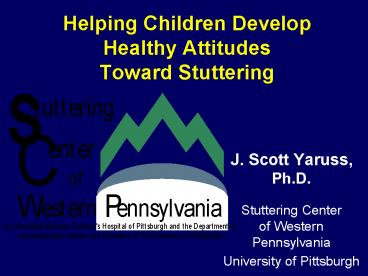Helping Children Develop Healthy Attitudes Toward Stuttering - PowerPoint PPT Presentation
Title:
Helping Children Develop Healthy Attitudes Toward Stuttering
Description:
Understand what they are doing when they stutter and how to change it ... Children who stutter do not respond adversely when parents provide feedback ... – PowerPoint PPT presentation
Number of Views:49
Avg rating:3.0/5.0
Title: Helping Children Develop Healthy Attitudes Toward Stuttering
1
Helping Children Develop Healthy AttitudesToward
Stuttering
- J. Scott Yaruss, Ph.D. Stuttering Centerof
Western Pennsylvania - University of Pittsburgh
2
Wait a minute!!!
- What do you mean by,Healthy AttitudesToward
Stuttering ?!?
3
Attitude Matters
- Stuttering can have a profound impact on
childrens ability to succeed in life - Butit doesnt have to be this way!
- As NSP parents, you know that the most successful
adult speakers are those who have been able to
accept their stuttering - Like stuttering, the process of developing
healthy attitudes can begin in early childhood
4
It is not stuttering that holds people back...
- It is how people reactto their stuttering
5
How should we expectchildren to reactto
stuttering?
6
Feelings about Stuttering
- It is normal for children to have emotions and
feelings about their stuttering - It is also normal for you to have emotions about
feelings about your childs stuttering
Children dont always understand their
feelingsyou can help!
7
The Traditional Role of Parents
- In speech therapy, parents typically receive lots
of advice about how to help children speak more
fluently - Slow down your own speech
- Pause before speaking
- Shorten and simply your sentences
- Dont interrupt the child
- Dont tell the child to slow down
8
Helping children speakmore fluently is good...
- but its not enough!!!
9
Sowhat elsecan parents do?
10
Parents Can Also Help Children...
- Understand what they are doing when they stutter
and how to change it - Learn how to react to stuttering and how to deal
with other peoples reactions - Interpret what it means to have a speech disorder
and (for older children) accept it - Feel acceptance regardless of their speech
11
Parents CanWHAT?!?
- Many parents have their own issues and concerns
about stuttering, making it difficult to react
supportively - Plus, parents are consistently told not to react
to their childrens stuttering - Do nothing at any time, by word or deed or
posture or facial expression, that would serve to
call attention to interruptions in (your child's)
speech. - (Johnson, 1962)
12
The Parents Dilemma
- Watching children stutter is hard!
- It is nearly impossible to watch our children
struggle with any difficulty without trying to do
something--anything--to help them - So...the advice to just ignore it is in direct
conflict with our parental instincts - The advice is wrong...our instincts are right!
13
Is It Really Okayto Talk about Stuttering?
- In a wordYES!
- There are no published reports of a relationship
between discussing...stuttering and sustained
increases in the frequency or severity of
stuttering - --Zebrowski Schum (1993)
- Children who stutter do not respond adversely
when parents provide feedback about their speech
fluency. - --Lincoln Onslow (1997)
14
Keeping Talking in Perspective
- Talking is just another motor skillyoung
children need to develop - It is perfectly normal for young childrento make
mistakes when learning to talk - Children make mistakes when learning every other
motor behavior and we accept it without concern - For older children who stutter, we need to
recognize that stuttering is normal for them
15
Why Talk about Stuttering?
I felt isolated and frustratedlike stuttering
was something to be ashamed of
This problem is so awful that my parents
can'tbear to talk... about it.
Some quotesfrom adultswho stutter
--Rustin Cook (1995)
16
Why Talk about Stuttering?
- Break the Conspiracy of Silence(Starkweather
Givens-Ackerman, 1997) - Help children understand stuttering
- Help children feel more comfortable about their
speaking abilities - Help children learn how to react to stuttering
- Help to normalize stuttering
17
Okay, So What Should We Say?
- (It depends)































